BATHORY – BORN IN ETERNAL FIRE Act I
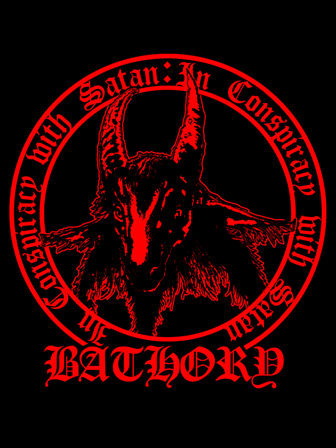
BATHORY is among the bands most important to me, and stands for the group that have formed and shaped my music taste. I will never forget how excited I was when I listened to their music for the first time: it was so full of darkness and mystical aura. Yes, their music is so suffused with something extremely magical – it was very hard to stop listening to those songs. That particular form of “possession” has rendered me extremely excited. And it hasn’t changed for years; lo and behold, the first time I got acquainted with BATHORY`s music was 35 years ago! I was 17-18 at the time; I shall always remember and will never forget how impressed I was with BATHORY`s music on that very day.
Well, the reasons for this tribute to BATHORY are many. Of course, my immense love for the band is one of them, no doubt. And thus, the release date of this issue (February 17, 2021) isn’t coincidental – this is, in fact, Ace`s birthday. To me, this is the homage I am paying to this exceptional artist, who, despite the fact he died so young (he was 38), Quorthon left a very significant legacy which became an eternal source of inspiration for hundreds of metal musicians all over the world. Candidly, I am quite disappointed not to have found too many interviews with BATHORY in our music magazines, here in Poland. The few I have discovered, deal with the later stages of BATHORY`s career and such albums as Requiem or Octagon. I have also discovered two interviews regarding Quorthon`s solo music project. The only exception is a short interview for Eternal Torment zine. No interviews covering the initial outputs of BATHORY, which are closest to my heart and soul. Therefore, we felt like working on something which compiles old, English-written interviews focused on BATHORY`s first six albums. In result, beside a detailed analysis of the full-length recordings, you’ll also find a handful of biographical information about the band, with many quotations taken from the old interviews with the Master. As well as our commentaries and annotations, of course.
I would like to say “thank you very much” to Paweł Wójtowicz for his titanic work translating the interviews. I am sure that without him this edition would be much shorter. I want to thank Wojtek Michalak too, who translated, from Spanish to Polish, excerpts from Jose Luis Cano Barron`s book; in result, we added a number of fragments from his work to the information we`d already gathered. I also want to express my gratitude to Paweł Kaczyński for his assistance with getting in touch with the bands who then answered our interview questions for this very issue. Of course, I wish to say thank you to everyone who`s agreed to partake in this project. I am deeply honoured and privileged for your time and interest. Appreciate this! Sadly, there’re a number of bands who we didn’t manage to get in contact with as well as musicians who didn’t actually care about our endeavour…yeah, it was not nice despite the fact most of these people are, allegedly, BATHORY die-hard fans. Well, maybe they were too busy or something like that, rather than unwilling to write a couple of sentences and then send them back to us. On the flip side, I am sure that such a difference would be nice for many bands, since, and I am sure of it, most these people are just sick and tired of interviews with same, repetitive and dull questions…
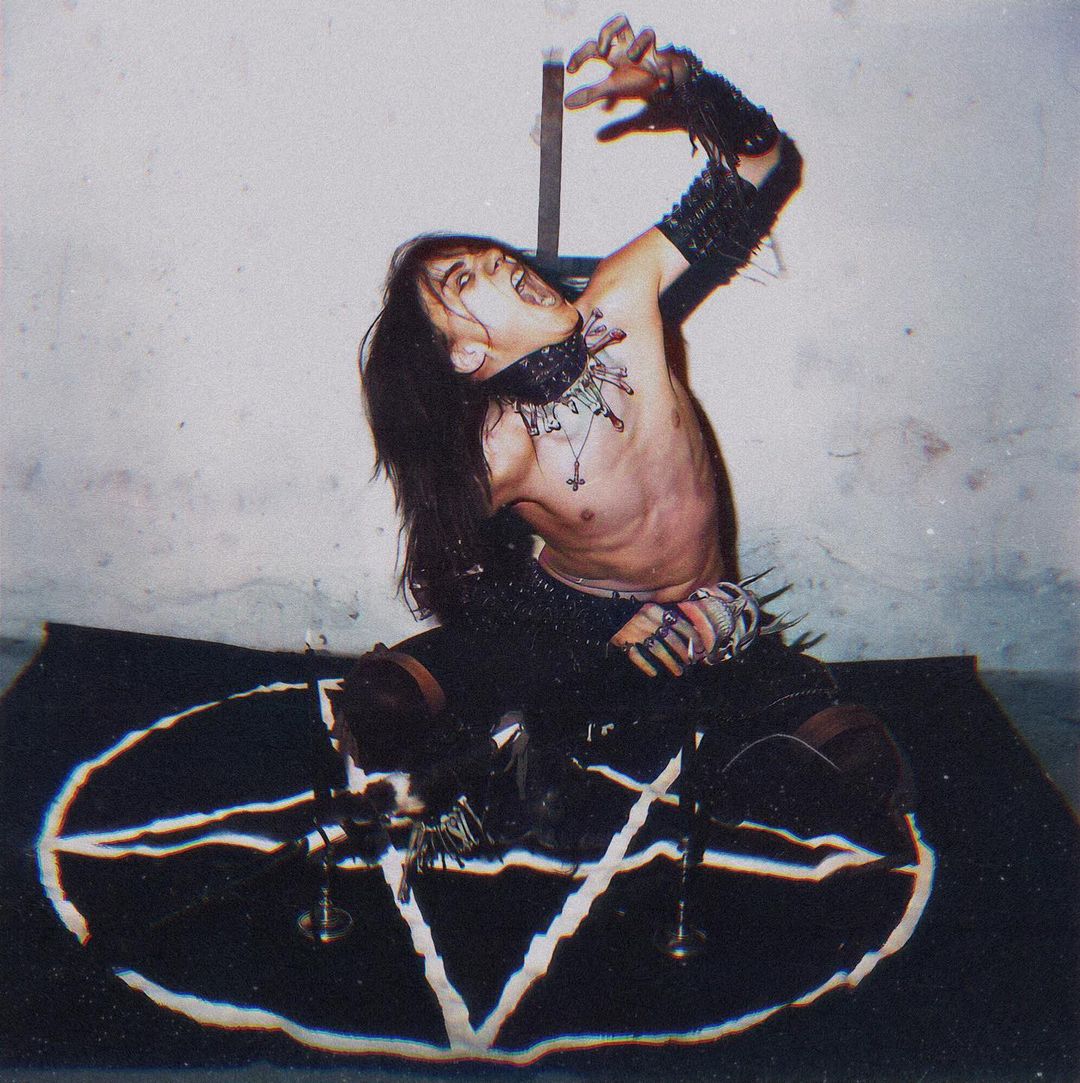
I am, however, very disappointed with the people who did, initially, agree to participate in our project but who, later, after we`d sent them out questions, stopped responding to our emails. Of course, we never heard from them again, not even mentioning receiving their answers to our emailed questions. In my view, this is a totally unprofessional approach and a sheer lack of respect for our work. Trust me, we have put a lot of effort, heart and time to turn this project into reality; it was an arduous a task indeed, bearing in mind we did ask about BATHORY each and every band and had to, to our best abilities, prepare an original set of questions for a particular band.
I fully realize we are a small, underground magazine which looks professional but isn’t printed in large numbers. Does it mean we are supposed to be ignored? Of course, it is perhaps a safe assumption that it would be much easier to convince big labels or particular musicians to participate in our project if we were as big as Kerrang!, Terrorizer, Rock Hard or Metal Hammer for instance, but we have never been like these “tycoons” and never will. We have always aimed at writing about the bands that we consider important – and to keep the fire of their music burning so these groups shall never be forgotten.
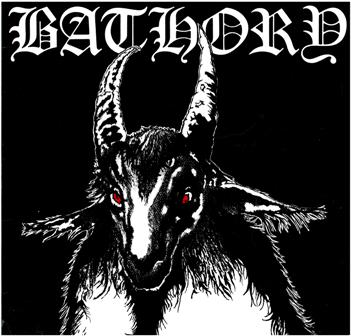
When I was 13 and just starting my music journey (back in 1980!!) I didn’t expect there`d be so many various metal music subgenres. I was lucky to witness the birth of metal`s most extreme forms and shapes. Those times were truly exciting, though getting music wasn’t easy, that’s for sure. Especially for the East Block people. I was craving a lot to learn as much as possible about NWOBHM and later all these new genres like speed, thrash, black and death. Back then, there was no internet, no Metal Archives or Blabbermouth and such…It was really time consuming to get any info about one`s favourite bands. I come from Poland, the country which, in the 80s, was separated from other Western countries by the Iron Curtain. Back then, we were always behind when it came to getting new music; there existed no music magazines whatsoever. Some years later, a very limited number of underground zines started to show up. Me, being always hungry for music, started a photocopy-styled, A5 format zine in the early 90s (Equilibrium of Noise), quite heavily inspired by early Thrash Em All and Holocaust Zine. With time, my zine started to evolve; same for my love for extreme metal – including BATHORY who, beside CELTIC FROST and VENOM, remains, in my opinion, one of the most important bands ever. And so, I was sure that, at some point in the future, there will appear a special edition, paying tribute to BATHORY. As you already know, there have been some articles about this band in previous OSMM editions. I have decided to expand on these, as many of you have been asking to purchase older issues which are no longer available. Additionally, those are in Polish, the fact which has serious limitations. And, obviously, in the meantime, we have found out much more info, which, I think, will enrich and refresh our knowledge on the subject. Who knows, maybe this idea will be morph into some sort of a book in the future, a real book on BATHORY?
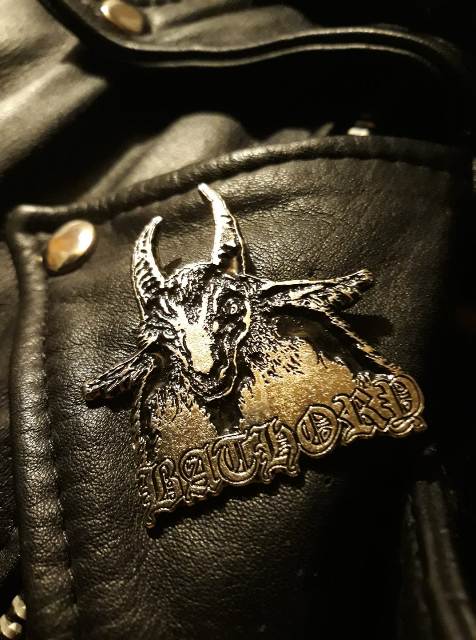
We are still very eager to get in contact with BATHORY`s ex-members. These people have always been in Quorthon`s shade and despite the fact he was the main person responsible for writing all the music, well, the band would have never existed without them guys, plain and simple. Quorthon was able to handle all the instruments really well, but rehearsing and working on songs was a totally different thing. And all these who are active musicians know what I am talking about. Ace tended to create music in his quite kitchen, using his acoustic guitar, but I am 100% sure this music wouldn’t sound so powerful but for the fact the songs had been rehearsed and re-rehearsed endlessly. Yes, if that but for this extreme amount of practising, the outcome would’ve been definitely different. A titanic group work, endless polishing off of orchestrations, rethinking tempos and song structures while rehearsing. All those elements worked out the way they were supposed to…and that’s the reason why I would love to talk about BATHORY`s ex-members – those guys are very important, they are and were part of the importance this immortal band stands for.
I do hope these pages are a good reason to discuss this issue again. Anyhow, please enjoy this special edition of our magazine, in which you`ll find a plethora of old BATHORY interviews, supplemented with our commentaries. We have also interviewed a number of bands for whom BATHORY`s music is important. As well as a handful of articles, including a special section for all the maniacs of vinyl editions, with the focal point on BATHORY`s debut album – both official and unofficial editions have been covered. Also, detailed reviews of BATHORY`s first 6 albums, commentaries from people involved in the music business, interviews with the writers who`ve worked on BATHORY`s detailed biographies, plenty of cool pictures as well as some collectors’ specials – making this fan edition a truly unique item for all die-hard BATHORY maniacs.
I do hope you will enjoy this issue…which is sort of journey to the past and remembrances of our young years. I want this retrospective issue to be a source of fire which will keep the legacy of BATHORY alive. Of course, this issue features plenty of well-known facts and information, but I am sure there`ll be some new data which will expand your knowledge on this cult band.
Well, have a pleasant read…lads and ladies, this is the history of one of the most influential and colorful bands in the history of extreme metal – BATHORY. It goes without saying how important band`s debut was, is and always will be for extreme metal`s various subgenres. Yes, the first full time recording by BATHORY is similar to another debut album, the one created by a well-known triple from Newcastle/UK. However, it seems like a safe assumption to say that the Bathory album elevated black metal to a much more extreme level. But, before we focus on details, let’s talk about the most important person of this story.
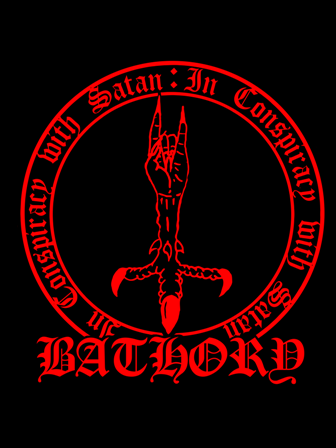
Thomas Börje Forsberg aka Ace, Quorthon Seth was born in Stockholm, Sweden on February 17, 1966. Right from the very early age, the boy was an unruly one. ADHD would be a proper term now to describe his behaviour – he was so full of energy that, in his adolescent years, he behaved really bad at school; his stance and image were too shocking to his teachers. Therefore, not surprisingly, our young rebel was expelled from school after a short stint.
But before the expulsion, thanks to a student work placement programme, Thomas got to a place which was to change his life forever. He got a part time position at the Tyfon Records studio. It was partly thanks to Stig Börje “The Boss” Forsberg, his father, already employed at TR, who wanted to keep an eye on him. Interestingly, the job itself didn’t look like a typical day at a recording studio too much. Still, Thomas was provided with a first-hand experience of how a producer`s typical day looked like.
The year of 1980 wasn’t a good one for Thomas. His parents got divorced, our guy lost his interest in school and, in result, got absorbed in music totally. At his early age, Thomas turned out to be very good with different kinds of instruments; and now he was able to start doing what he was really passionate about – which means music.
It ought to be remembered that at the time MOTÖRHEAD was considered the fastest band on earth. Therefore, it comes as no surprise that Quorthon mentioned the Britishers as his main inspiration. The Swedish extreme metal scene didn’t practically exist at the time; emerging NWOBHM was, of course, an ignition point for setting up what a truly extreme music was, but it wasn’t too powerful back then and its lethal range wasn’t spectacularly impressive.
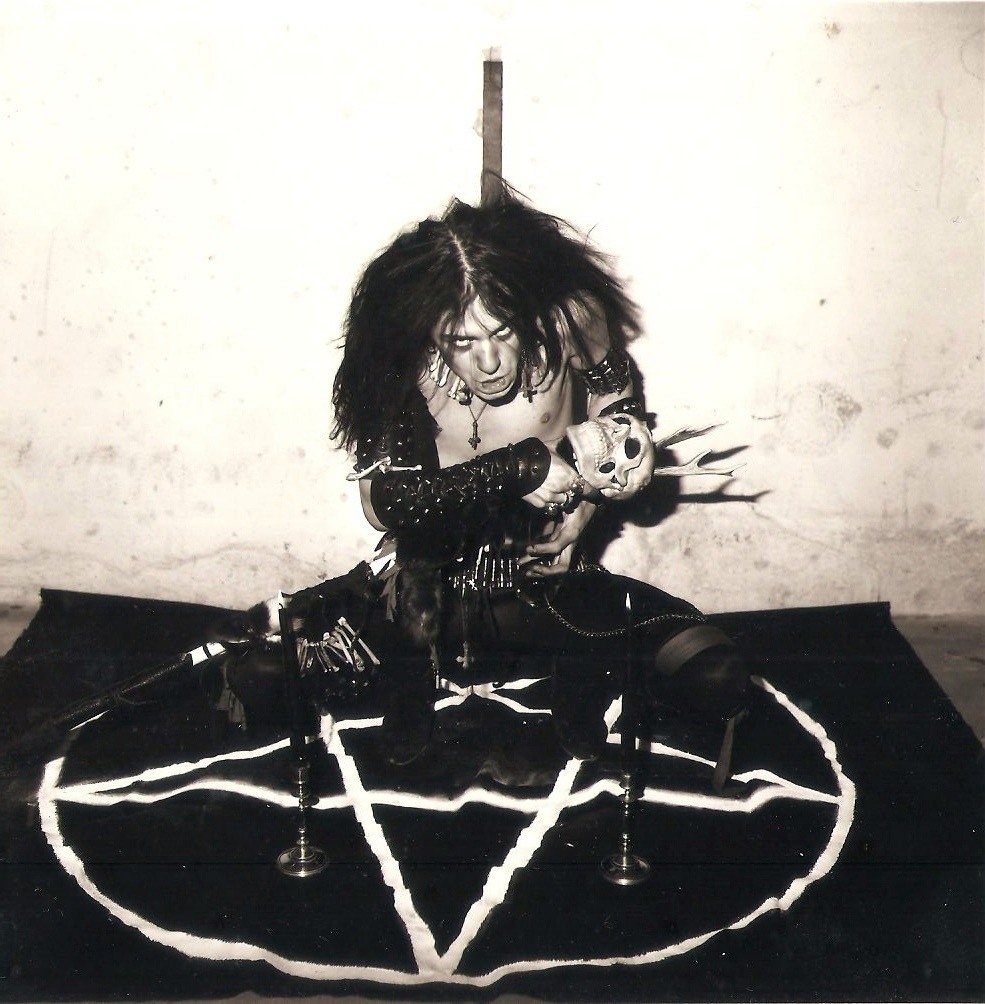
The early 80s was abundant with music coming from following bands: MOTÖRHEAD, KISS, BLACK SABBATH, THE EXPLOITED or GBH, as well as initial, rebellious punk rock. Our guy partook in a number of different projects like STRIDSKUK, for instance, a band which surely attracted fans` attention; but young Quorthon wasn’t too satisfied after all. He did look for something more extreme. Interestingly, Ace kept saying his spectrum of music interests was really vast at the time. He apparently was very much into playing extreme music, on the other hand, he was keen on such bands as KISS, THE BEATLES, LED ZEPPELIN, KATE BUSH and classic music; the genre which had in fact a huge influence on him. I am sure that if it hadn’t been for Richard Wagner, such monumental, epic classics like: Blood Fire Death, Hammerheart or Twilight of the Gods would never have been created. But first things first…
Brutalisation of metal, which, in fact, was the process that created the foundation for new subgenres was gaining speed, despite the fact music stores back then weren’t too keen on stocking this kind of music. Heavy metal was king, simples. The new, more violent forms of metal were unknown to many. In result, the stores were not too willing to invest into such “new stuff”…this happened after some time, nevertheless.
Börje Forsberg was a producer at Tyfon Studio and OZ`s manager (a band from Finland). That’s what he recalled about the BATHORY`s debut album recording session: “I had my own office at Electra Records in Kista. Every Friday, I used to present new stuff to various sellers. Man, you should`ve seen their faces when I presented the album to them. They went still, looking at each other and then at me: is this guy really crazy or something? I told them that stuff was going to sell really well, but they weren’t convinced. Well, after a couple of months, the record had to be repressed numerous times.”
This situation shows very clearly how, at the time, extreme music was perceived. No one, beside Börje, believed BATHORY was going to become successful. In fact, his intuition didn’t fail him. And BATHORY, after a short while, became one of the most important groups in the history of EXTREME METAL.
And talking about OZ here; well, it is worth mentioning that their 1983`s album cover (Fire in the Brain), features Quorthon holding a burning skull in his hand.
The year of 1983 was a crucial one for Quorthon. After his trip to London and visit to the wax museum, he decided to create a new band called BATHORY. He had been inspired by a very interesting wax figure depicting Elisabeth Bathory, a Hungarian duchess, in a bathtub full of blood. She was known for her incredible cruelty and incessant hunger for human blood. As for the name BATHORY itself, well, there are different views on this matter. Some claim BATHORY was band`s first choice. Some other insist numerous other band-names were considered as well, such as MEPHISTO, NATAS, NOSFERATU or COUNTESS BATHORY.
Jose Luis Cano, the author of “Del Hades al Valhalla” claims that the band used the following names for some time: NATAS, NOSFERATU and COUNTESS BATHORY. In order to support this view, he published in his book some sketches of NATAS and COUNTESS BATHORY logos he obtained from Frederick Melander. In his book, we can read that “NATAS (or Satan written way back) became an official band name on May 23, 1983 and under that name they played music until September when they changed the name to NOSFERATU. Ace was very stubborn about his choice, and not too keen on other proposals. Finally, in October 1983, they became COUNTESS BATHORY.”
The sketches are below:
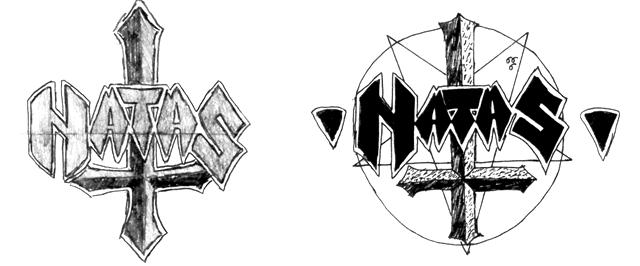
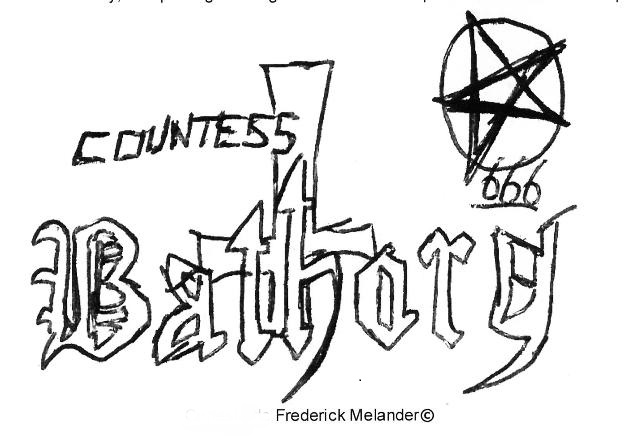
In the same book, we can learn about Ace`s other band , namely YELLOW which, for some time, tried to imitate KISS. Nothing serious, just some youthful fun, nothing professional, but this needs to be noted as Ace partook in that project, as well.
The early 1983 was spent on searching for musicians appropriate for Quorthon` possessed visions of playing the most brutal music in the world. Quorthon put an ad in a local music magazine. In result, a number of interested people got in touch with him, including drummer Jonas “Vans” Åkerlund and bassist Fredrick “Freddan’’ Haanoi, previously involved in a heavy metal bands called DRIFTER, and later renamed to DIE CAST and later again to SATAN. That name didn’t long too last since there already existed a band SATAN in the UK at the time, too.
On March 16, 1983 Quorthon met with other musicians in front of the Musikborsen music store in Kungsholmen, in Stockholm. Then they started their first rehearsal at Sigtunagatan, close to Eriksplan, in the basement they`d rented from Fredden`s stepfather.
The band kept practising quite extensively, even up to four times a week. During the initial period, they rehearsed cover songs of such groups as: KISS, MOTÖRHEAD, BLACK SABBATH and SAXON, as well as the members worked on their own songs.
The other guys were very surprised to discover how skillful Ace was with his brown Gibson Les Paul, he`d brought to their first rehearsal. Undeniably, Ace was much better a musician than the rest of the band; he previously had also recorded a number of riffs on tapes. Right from the very beginning, it was obvious who the real leader was and that Ace also had a clear perception of what direction BATHORY’S music was to follow in the future. Still, before BATHORY`s unique sound was fully elaborated, some time was to pass by.
It was in Sigtungant where the first song was created – “Satan Is My Master”, then, after a couple of days another two emerged: “Witchcraft” and „Sacrifice”, as well as the immortal classic: “The Return of the Darkness and Evil” which, in his early version, was featured in the Scandinavian Metal Attack compilation; the release which let the world know about BATHORY. Interestingly, this song was not featured in the debut album, but became, instead, the title track of BATHORY`s second output.
Unfortunately, the other members` visions regarding music differed significantly from Quorthon`s since his intention was to play ultra-fast and even more brutal tunes. His cousins didn’t share his fascination for that approach. Getting through his ideas was constantly getting harder and harder. The other members leaned towards more classic, heavy metal-oriented music in the vein of JUDAS PRIEST, IRON MAIDEN, SAXON or even melodic punk. That wasn’t what he wanted, since he did wish to create a truly evil and wild music; something which, at the time, wasn’t as popular and accepted as classic hard and heavy metal. Yes, VENOM, the forefathers of black metal had already for some years been treading the unconventional paths, heating up the scene, but, still, extreme metal was not taken too seriously. The situation was to change after VENOM`s first tour in the USA, when bands such as EXODUS, SLAYER, DARK ANGEL or METALLICA became, quite suddenly and unexpectedly, much faster and thus, rather unintentionally, a new subgenre was born, namely Thrash Metal.
Right from the very beginning, Quorthon could clearly state which direction the change was coming from and where he wanted to take BATHORY to; and that he wanted to create the most extreme form of metal music on earth.
Jonas Åkerlund (currently living in Los Angeles) when asked by the authors of BLOOD FIRE DEATH (the book on Swedish metal) recollected those days: “We proceeded to the rehearsal place right way; it was located in the basement of a large building on Sigtunagatan. Ace took out his guitar and it became easily noticeable that he was a better musician than any other guys we already had played with. He also had a huge music collection. We got to like each other right away (…). Our initial sound was heavy, but with time we got faster and faster. It was Ace who wanted us to be fast.” Jonas continued his story about Quorthon: “All he did was coming right from his heart. Ace was a very introverted kind of guy; his creativity came from his inner self; me and Frederik were always trying to keep up with contemporary trends. Now, when I have gotten older, I can clearly see how few people possess this very feature. I would say he was one of the most introverted rock stars…a genius.“
According to Luis Cano, Frederick and Jonas talked to Ace about recruiting a lead guitarist. The writer claims that Ace agreed he wasn’t the best guitarist out there and thus he didn’t want to slow the group down. I would disagree on this an would add that Ace would never have said anything like that since he was too good a guitarist and didn’t need, in fact, any competition at all.
Another interesting fact is that Freddan and Vans tried to convince Ace that a new vocalist was a necessity. In Del Hades al Valhalla, this situation is described as follows: “In the fall of 1983, Vans and Freddan got a guy named The Animal (Bjorn Kristiansen) and that fellow was supposed to become a new vocalist. His image, face expressions and singing style were closer to David Coverdale`s or Joey Tempest`s, not that of a genuine, proverbial “beast” as his nickname might have suggested. Of course, Ace wasn’t too happy about that, but didn’t have to do anything since Kristiansen did literally run away from the rehearsal place. But, at least, Kristiansen had enough decency to rehearse with the other guys for some time, before he called it quits and finally disappeared, scared of the band`s weird and unusual image. His departure didn’t cause any harm to BATHORY, so even Freddan and Vans realized that guy was completely useless to work with on what had already been created – he was even too lame to have a beer with”.
Before Thomas became Quorthon, he used the nickname of “Ace” quite often, revealing his fascination with KISS`s solo guitarist Ace Frehley. He had also had a number of other, strangely sounding nicknames before he finally became Quorthon for good. In the interview published in a Norwegian magazine Metal Shuffle (1994) when asked about the origin of his nickname, he explained that “It must have started sometime in the 1970/1980 (1977 was KISS`s first European tour -ed.). I realized that KISS were using pseudonyms. And other bands did the same, too. I just also did what they`d done despite the facts some of these names are hard to pronounce. Quorthon stands for the struggle with Christ on Judgment Day. A fascinating name, that’s why I started to use it.
Another, very controversial issue is connected with BATHORY`s hypothetical live shows in the band`s early stage of career. According to Backstage Magazine`s second issue (1996), Quorthon said that “Well, we played live a little in the suburb of Alvik, at a cinema next to Nocke, close to Smedslätten. There were like what, maybe 100 fans watching us and maybe 30 bands performing”.
Here, we face a great deal of contradictions and much unclarity. Quorthon mentioned they performed live and, on several other occasions, denied doing that. In Slayer Magazine`s second issue, when asked about playing live in Sweden, Quorthon stated that “We never are allowed to play live; each and every time we talk to the managers owing a particular venue they usually say we cannot play live there because we are too extreme. It is so dumb, yeah.”
In another interview, Jonas Åkerlund sheds some light on BATHORY`s live shows: “ I can definitely claim that we played live three times; but Frederik says it was just two. I can trust him on this issue since he is much more precise than I am. Those were some shitty fests we performed live at as well as the ones in the basement in Soder. But, at least, there were some audience. Most of people used to frequent a studio at Sankt Eriksplan but that venue was beyond our reach. We weren’t cool enough”
How about Jose Luis and his book in this context? “Contrary to what all the people think, BATHORY did perform a number of live shows in Stockholm back in 1983 and early 1984, when Freddan and Jonas were still band members. Others took place in the Nockeby and Alvik area in 1985, just before The Return was recorded. But with no cousins in the band. Those, factually, were “public” rehearsals or performing at friends` parties; not proper live shows per se. Therefore, it wasn’t easy to remember those. (8). There were some plans for a bigger live show together with OZ in Rålambshovsparken in 1983, but it didn’t happen, regretfully.”
Undeniably, many of us regret we haven’t been lucky enough to see BATHORY perform live. It would be a totally unique experience, that’s for sure. Just think about VENOM and their performance at Odeon from 1984 or 1985. Yeah, the sheer inferno unleashed by BATHORY would have been epic, no doubt about that, since they always intended to outclass the Britishers. Yeah, it’s a pity that Quorthon didn’t actually decide on playing live, due to line-up problems. Was that the real reason?
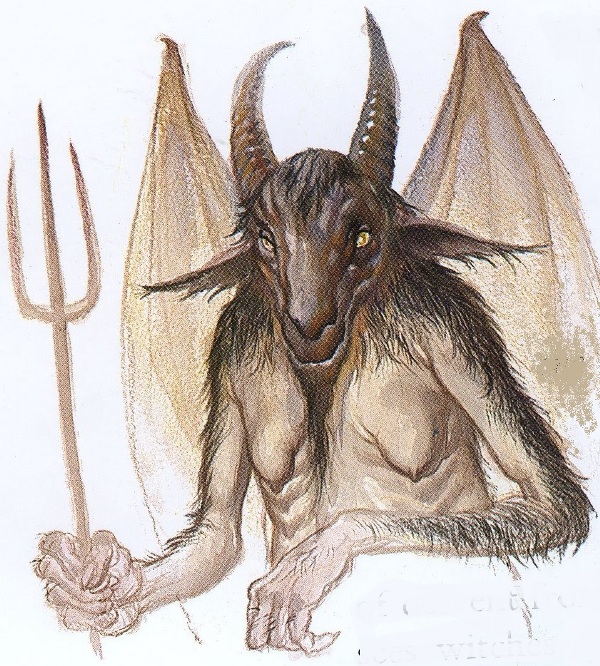
In the summer of 1983, Ace recruited two new musicians: Rickard “Ribbab” Bergman (bass) and his old pal from STRIDSKUK - Johan Elven (drums). They replaced Frederick and Jonas who`d left for London. During the resumed rehearsals, the band managed to record some new tracks.
In Gasp Magazine (vol. 2, #6, Fall 1994) Ace described the Scandinavian Metal Attack compilation recording session: “One day, those guys went to London for a weekend and I used our two-song demo to jam with my two friends – one of them was Paul (drums). In result we got two songs ready – “Die in Fire” and “You don´t Move Me (I don´t Give a Fuck)”. Both were featured on Jubileum albums. Those songs were recorded when the first line-up was still together, just before we finished the compilation tracks. So, as you can see, these songs are very important for the band, historically speaking.
It seemed like the band was doing good at the time. But BATHORY struggled to find a good rehearsal place. Their noisy music, constant boozing and rebellious attitude didn’t help, that’s for sure. The band was on the brink of breaking up since the internal disagreement on band`s future music style became more and more serious.
This story is well known to many, but I want to retell it since it had an enormous influence on BATHORY`s future since the compilation I want to talk about allowed the band to show their omnipotent music and true potential. In late 1983, Tyfon Records planned to release a vinyl compilation album titled Scandinavian Metal Attack, featuring such bands as: OZ, TRASH, SPITFIRE, ZERO NINE - with two tracks from each band. One of the Finnish bands had bailed before the whole release was finalized. The record company didn’t know what to do about that situation, but it seemed like Quorthon was lucky at that point, since he was “banished” to work at Tyfon Records and out of the blue he got a chance to present his music to masses. He didn’t want to waste such an opportunity. On this compilation we can find two BATHORY`s tracks: “Sacrifice” and “The Return of Darkness and Evil”. These songs were very well received by fans and caused that the band was able to release a full-length album, initially named “Pentagrammaton”. However, despite band`s good fortunes and truly great response from the underground, Quorthon fired the other members and in consequence BATHORY ceased to exist.
When asked in Metal Forces (1987) about his feelings on the contemporary line-up, consisting of the people who he had recorded the two compilation tracks back then with, he replied: “We recorded two songs for the Scandinavian Metal Attack in February 1984, but we split up shortly after because I wanted to play faster music whereas they didn’t want to. We were simply moving away from each other.
In the Blood Fire Death book, Börje “The Boss’’ Forsberg recollected those times: “Ok, check this out. So, those two clowns got in. That was just the most hilarious shit to happen in the studio ever. They were sure they needed to look like KISS when recording music so they came all dressed in leather, jackets and started to unleash hell. I thought – what the heck is this? But that was…cool, too! It had something special to it, something unique. Never heard anything like this before. SEX PISTOLS were like some Swedish top popstars compared to these guys”.
It took Börje two hours to record the two tracks featured on the said vinyl compilation.
Scandinavian Metal Attack featured a set of questions in order for listeners to indicate which songs from the compilation they considered their most favourite. Interestingly, most of answers pointed BATHORY. It didn’t take Börje long to realize that BATHORY needed a full-length album. He recollected: “I said: Ace, ffs, do you have any more songs ready? You guys got to record a full-length album, no doubt about it! He had in fact plenty of songs ready. He took out a small tape player and played some pre-recorded guitar outtakes.”
Alas, line-up problems became more apparent. According to Quorthon: “Soon after SMA was out, I decided to let the other guys go. Since then, it`s been really hard to find fine musicians. I auditioned a number of fellows, but after we started rehearsing together, well, after a couple of months I couldn’t stand them any longer. Many people compared us to such bands as HELLHAMMER/CELTIC FROST, VENOM, SLAYER, DESTRUCTION, SODOM, and even VOI...blahh...VOD. I love VENOM`s type of black metal. SLAYER is always full of energy and yes: they are so fast. (This is one of very few interviews in which Quorthon admits he likes and listens to VENOM. ed.)
In the same interview, Quorthon scoffed HELLHAMMER and CELTIC FROST; I can’t understand this approach, since Warrior`s both bands have always been very important for the black metal movement. VENOM, BATHORY and HELLHAMMER are, to many maniacs, the “unholy trinity”, in other words, these are the groups who created black metal. Apparently, Quorthon wasn’t too fond of competition and, with all his might, attempted to become the most extreme and the darkest band ever…
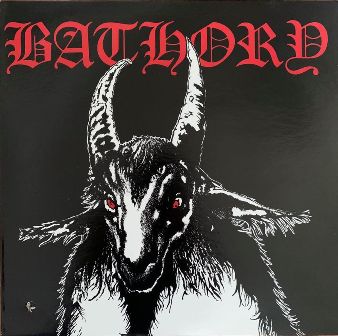
Let’s get back to the then situation and a temporary suspension of BATHORY. Quorthon didn’t lay down his weapons, but tirelessly kept looking for right musicians. In June 1984, he joined forces with Stefan Larson (drums) and Rickard Bergman (bass). They shortly after entered the Heavenshore Studio in Stockholm to record their debut album, simply titled Bathory. It was a short session, mere 56 hours which cost them 700 USD. The album was produced by Quorthon and Boss themselves. In Blackthorn Magazine (1985), Quorthon described this session in the following manner: “I was a bit concerned if we would be able to release that album at all. The programme is quite short, but we didn’t have anything else. The label kept bugging us to record an album, to see how it`d be selling. After the SMA compilation was out, it turned out BATHORY was the band from the compilation that fans liked most. So, the label`s policy was to release a full-length album and see what the future would bring. Now you can clearly see that BATHORY`s albums are selling very well and the band is enormously popular all over the world. In result, we can now focus on a good, fast and lethal Speed Metal with good lyrics and fast songs.”
Shortly after Scandinavian Metal Attack was out, in Bernard Doe`s interview, Quorthon recollected: “A couple of months later, I was contacted by the label and they told me they were getting plenty of mail because of that split compilation and in result they wanted me to record a full-length album for them. I told them the band had split up, but they kept bugging me so I decided to start writing new tracks in order to elaborate on BATHORY`s unique style, you know, to get BATHORY`s distinctive quality. It was hard since I was busy auditioning new guys for the band too.
In the same interview, Quorthon elaborated on his musical beginnings from the times before BATHORY formed:
“– Say, did you enjoy punk shit?
– Oh, yeah. When I was young, I used to roam downtown with green hair and grenade pins, you know, this sort of stuff. I was so much into this kind of stuff.
–You mentioned punk and MOTÖRHEAD. Any other bands and inspirations? I read you like THE BEATLES?
– I listen to a lot of different things. From classical music to totally weird music. As for me, THE BEATLES are just best band ever. But yeah, they certainly have nothing to do with BATHORY.
– Well, is this true you are an ardent fan of KISS?
– When I was a kid, yes. In general, when you are young, you are influenced by everything. KISS is so crazy and theatrical.“
Thomas`s first pseudonym – “Ace” had, apparently, a lot to do with his youthful fascination with KISS`s guitarist – Ace Frehley. However, before Quorthon became interested in playing guitar, he had a very interesting music episode which I want to talk about. As mentioned, Thomas had always been into KISS a lot and when the Americans came to Sweden during their first European tour, he asked his father to go and see them live. Since that live show, music became Ace`s air he wanted to breathe in. Börje noticed his son was good with drums. In result, his 10-year-old son got his first drum kit and playing it became Thomas`s obsession. Thomas would take the kit to a nearby forest and keep playing it all day long. Unfortunately, his neighbours didn’t share his passion for the instrument so at dusk he would have to take the drum kit back home.
In Blood Fire Death, Börje “The Boss” Forsberg recollected those times: “Holy shit, it didn’t take long before this fellow was able to play drums solos from Alive by KISS! All he took to, would become very easy for him, apparently. Opposite is true for me. I can easily hear what music is good or bad, but it is very hard for me to play it. It was all so easy for him.”
As we can see, Thomas`s skills attracted his father`s attention, who was willing to get those skills developed – in result, the father and son cooperated with each other for many years. Who knows what would have happened to young Forsberg if it hadn’t been for Boss`s assistance. Alas, many parents don’t pay any attention to their children`s natural talents, instead they try to transfer their unfulfilled dreams onto them – in a word, they fail to appreciate what their children are really good at and therefore help them develop these skills. Well, it didn’t happen in the case of Thomas and, under his father’s watchful eye, he fully developed and improved his capabilities.
Many aware artists, beside creating music, try to develop their artistic image as well; therefore, I decided to provide Quorthon`s view on his artistic pseudonym: “I think that an artist needs a pseudonym to differentiate himself from who he really is as a private person. Thus “Quorthon” fits perfectly. It is the name of the prince who is half man and half demon.”
Shortly after the BATHORY`s debut album was out (October 2, 1984), Quorthon remarked: “I am aware of the fact we`re quite popular in numerous “caves”, after I`ve read BATHORY`s review in Kerrang! magazine.“
Sounds weird, right? Since BATHORY`s debut album was scoffed and compared to “water flushed down the bathtub”… Yes, really eerie, since Quorthon mentioned clearly that the review was favorable. Maybe that was sort of a deceitful comment, since the “worst” reviews tended to be the “best” form of advertisement for such young bands as: MOTÖRHEAD, VENOM or HELLHAMMER and their early releases. The contemporary music magazines weren’t able to comprehend their music properly, plain and simple. But many fans of extreme music held the opposite view on this matter: if something was filthy and evil – well, they wanted to hear that. It usually worked like that and the bands who were mocked and ridiculed in press were, in underground, praised and enjoyed by maniacs. So, maybe this “bad” review was actually BATHORY`s “best” review and that was the very point Quorthon made with his remark.
One thing was certain. The contemporary underground paid heed to that exceptional debut album and, in result, it was selling like hot cakes.
In the same interview, Quorthon, when asked about the fans` interest, responded: “I think that the band`s gotten really popular; as for sales, I have no idea how many copies have been sold. A lot, I presume, more than actually planned. I think about 5 thousand in Sweden, 7 thousand in West Germany. Another couple of thousands in the US and other countries.“
In an interview for Metal Forces (1987), Quorthon explained why the debut album didn’t feature the contemporary lineup or any band photos: “There were plenty of people involved and the reason was the guys who`d joined the band weren’t of the right sort, so I had to get rid of them. They didn’t even last long enough to take our band photos, so every time I was being interviewed, I usually had to provide my own photos.”
This clearly shows how alone Quorthon was in his creation of BATHORY`s music and how few people understood what band`s music was really all about.
In Backstage #6 (1990), Ace explained further about the lineup problems: “The first lineup was together for a year. The reason was we were good friends and they already had access to a free rehearsal space for us. But when it all became a bit more serious, I mean, when we had recorded two songs for SMA in January 1984, I just couldn’t keep them any longer. Well, there is no fun when you have a bassist who only knows how to play using the E-string and a drummer who is barely able to play at all. Getting two fellows who are in the “Swedish vibe”, who look good and who are aware of what it is all about and can write good music is more or less undoable. Most people in Sweden are well educated, so when it comes to Rock music, there is no one to choose from. They prefer to have short hair in order to keep their jobs and stay home with their ill girlfriend rather than go out and rehearse with their bands. No point in keeping them in your band so people like these are just being fired all the time. New names, new people, all the time. We didn’t want to mislead the fans, make them think this situation wouldn’t last long. Therefore, we never published any pictures. But fans took it as some sort of secretiveness and, in result, were more interested in our band. “
According to Backstage Magazine`s interview with Quorthon (1996) concerning BATHORY`s debut album, “People who listen to the final outcome which is the album itself, fail to realize how much effort is usually put in it. When we recorded our first album, we didn’t mix it at all, we just got our gear ready and started playing music. We simply didn’t know how to adjust our equipment, so we just cranked everything to 5 and that was that. I would say all the beginnings and endings of our songs have some sort of melody to them, since we didn’t exactly know how to start and finish songs properly. We just plugged our bass and guitars into my minute 20-watt Yamaha amplifier .”
- We had a good deal, we could use the studio for four weeks and that cost us 250 USD. We had to use the studio in summer when the owners weren’t at home since they didn’t want to listen to our music. Therefore, the recording took place in June, during summer holidays. No mixing, just direct use of drums, two bars and that was that.
- We actually never planned to record that album…we just hoped to gather up enough songs to demonstrate what our music is all about and, at some point in the future, to get a good contract to re-record these songs properly. But, after Scandinavian Metal Attack was out, it turned out we were the only band to get plenty of mail and, in result, we decided to record our first album.”
BATHORY`s debut album, despite its extreme popularity, did attract a lot of controversies too. BATHORY was considered VENOM`s clone and, in consequence, Quorthon kept denying the Newcastle`s triple`s influence on his own band. Anyhow, it is hard not to notice how strongly VENOM`s music is present in BATHORY`s debut album. It is not even the image, layout or lyrics but the very music itself.
According to Quorthon, “I heard VENOM at Tyfon Records` office. And I said to myself that zines must learn a bit more about such bands as HELLHAMMER, POSSESSED, KREATOR, DESTRUCTION and SODOM. I can also remember some other bands or at least some of their tracks: DEMON EYES, RAVEN, BLASPHEME and VULCAIN (most likely Quorthon meant VULCANO from Brazil, not the French Heavy Metal outfit VULCAIN – ed.), and of course Canadian EXCITER and that band`s sound which we wanted to imitate, as far as I can remember, on our THE RETURN OF THE DARKNESS AND EVIL album. Back then, I also listened to the whole SLAYER album but, in all frankness, I can’t tell you know if I liked that or not. I think the vocals were too high-pitched and I didn’t enjoy the double solos either. It was back then, I suspect, when our bassist brought me METALLICA`s debut album (in December), but what impressed me was Marshall’s pure sound they`d managed to achieve, that was that. As well as I can recollect ANTHRAX and their debut album, from the same time, more or less. I thought those guys are tough. Good music, no doubt, but it lacked something. At the time, there were plenty of differences between bands from Europe and the US. I mean, I wouldn’t say worse or better - just different. It still exists, this difference, I reckon. Candidly, we were so focused on our issues that our interests were very, very limited. For instance, I had no interest in such groups like KREATOR or CELTIC FROST. I couldn’t stomach those guys. But the fanzines were toying with this issue and kept repeating this fact again and again….I was also laughing at VOIVOD but, to tell you the truth, I hadn’t even listened to their tracks at all. In 1999 or 2000 someone, anonymously, sent me over a couple of their cds. I listened to their latest stuff and I must confess that I was very wrong about them since their music is awesome and very original. So, I became enlightened – 17 years later. The fact I listened to so many different bands at the time resulted in our second album being so full of different influences. Yeah, now it seems obvious.
After the debut album was out, the internal problems became more and more apparent. Quorthon mentioned in Close Up that: “The guys who recorded the debut album with me, didn’t realize one can sing about Satan. They didn’t want to wear leather or chains and spikes for that matter. Joey Tempest was the guy in Sweden back then who you had to look like. If you didn’t have that look, well, you wouldn’t get laid after playing live shows. But I wasn’t into that at all. “
Quorthon was responsible for debut album`s cover; he re-worked Joseph A. Smith`s idea originally intended in 1981 for Witches by Erica Jong. Ace didn’t realize back then that the goat motif would become BATHORY`s trademark for years to come and a genuine coat of arms of BATHORY hordes.
The starting point for both VENOM and BATHORY was, undeniably, the occult vibe their music oozed off, combined with the satanic atmosphere. In Blackthorn zine (1985), we can read the following:
- “How serious are your lyrics? Or these are same as other BM bands`?”
- “I sing about occult issues and Satan because these things interest me a lot. I am not into anything else, coz these are of no interest to me. Thus, I am like other BM bands in this matter, just like you said. If I was into Science Fiction I would sing about these issues, right? I feel sorry for the bands who use occultism to write their lyrics. In my case, well, I wear identical clothes for both band photos and in everyday life.”
In Witch (1994), we find another proof Quorthon was involved in occultism: “I have an inverted cross burnt on my arm`s top part. I was very much into this kind of stuff in 1983-1985; but when you realize that Christianity is fake, then you need to come clean with yourself and admit Satanism is fake too; since Satanism stems from Christianity.”
I think that Quorthon`s interest in dark art directly resulted in the diabolical form of the music he created:
With time, the initial, satanic atmosphere surrounding BATHORY started to annoy Quorthon. He was especially dissatisfied with others, trying to connect him with what was going on in Norway at the time, directly resulting from the second wave of black metal: church burnings and killings, in particular. Boss recollected that: “The first, occult LP`s were like sagas for him. When people failed to understand those albums properly and when he was accused of slaughtering sheep and eating raw meat, well, that was too much for him. He was a huge animal lover. He wouldn’t have hurt a fly. It was all smoke and mirrors to him. Some fans, those who noticed Ace wasn’t a true Satanist, still wanted him to be a really crazy guy.“
When asked in ULTRAKILL MAG (June/July 1994, # 2) if he, being one of originators of black metal movement, felt responsible for any violence that second wave BM caused in Norway, he replied: “Say, when you take a look at BATHORY`s first line up that was formed 10 years ago, well, back then we all were just very young. We didn’t consider ourselves originators of the movement. It was just happening around us. It was the media that started to combine us together – VENOM, CELTIC FROST and SODOM, calling us black metal bands. All we did was to present satanic image as rebellion against society, simples.”
In Grimoire of Exalted Deeds #7, Quorthon presented his view on maniacs from Norway: “These guys wrote a lot of letters to me when they were young. It was when they were huge fans of BATHORY and they even had their own zine. Can’t remember the zine`s name now (most likely, Quorthon meant Slayer Mag ed.). They were so much into Satanism which we practiced at the time. Some of those guys were later arrested for what they`d done: they burnt down some churches, killed people. They said to the police that my music influenced them to do that. So, I got a letter from Norwegian authorities with questions. That was weird. All that was about music and fantasies” I think that all that happened in Norway caused Quorthon to try to distance himself from that as much as possible, in order not to be involved, directly or indirectly.
Quorthon remarked, in one of KERRANG!`s issues from 1990, that: “People picture me as a bloodsucking vampire who lives in some cave in Sweden. I haven’t spent 6 months playing my guitar and rehearsing to answer dumb question whether I have recently killed a child…”
It is a widely held view that BATHORY, similar to VENOM, perceived Satanism just as a perfect background for their music. As for BATHORY, it is indeed hard to believe; yet you can feel how dark his music is. Therefore, is it possible to play such dark music if you don’t feel it? Many fans didn’t want to accept what Quorthon said about this issue and treated his early lyrics and music quite literally.
One thing is certain though. Even if that was just his image, well, that image was truly powerful. No other band (maybe beside WATAIN) has been ever able to create such a dark and menacing atmosphere. I am sure that if BATHORY had ever played live, well, those shows would have been similar to WATAIN`s live shows; dark, full of infernal vibe with plenty of sulphur and fire.
Shortly after the debut album was out, Tyfon Records became flooded with letters, addressed to Quorthon. Plenty of fans enjoyed BATHORY`s music. A lot of interview requests started to pop up too, 10 per month (on average), which did look very promising for the band. But what happened after The Return was out, well, it was hard to comprehend, even for Quorthon himself.
For many fans, the very fact a musician/band get influenced by other`s music isn’t considered deplorable at all. Quorthon tried to convince others, despite obvious similarities, that he wasn’t inspired by VENOM, and listed a bunch of other bands instead: MOTÖRHEAD, KISS, BLACK SABBATH as well as two punk rocks crews: GBH and THE EXPLOITED.
Hard to believe, indeed, that VENOM hadn’t been included in the above set of inspirations. I am talking about this issue not to diminish BATHORY`s contribution in music, but to pay heed to a number of undeniable coincidences and similarities like for instance: “In League with Satan” by VENOM and “In Conspiracy with Satan” by BATHORY... both bands had tracks called “Dust to Dust”, - BATHORY just ripped that track off of VENOM. Or “Sacrifice” for that matter. Similar lyrics in “Buried Alive” and “Raise the Dead”. Just take a look at these:
My lungs gasp for air, my eyes scream for sight I promise the rise of my body this night I tear at the lid, my fingers they bleed
– Venom, 1982
If those two albums had been released at the same time, then one could think that might`ve been a coincidence…I hardly believe so.
I gasp for air I scream for sight and fight against torment and dread Calling the vengeance I tear at the lid and promise to raise from the dead.
– Bathory, 1984
Another thing is the layout. VENOM`s “Welcome to Hell” and BATHORY`s debut album appear very similar and clearly show how much the early BATHORY was influenced by VENOM. In one of the interviews from 1987, Quorthon said: “In my view, there are no similarities between VENOM and BATHORY whatsoever. However, Black Metal is an absolutely amazing and original album – I listened to it 3 months after I formed BATHORY. Back then, there was no thrash or speed metal and that was why VENOM was so unique. Still, they deteriorated and became trendy – but it doesn’t matter, really. What I mean is that if compared to <<Black Metal>>, <<At War with Satan>> and <<Possessed>> are shitty”.
In an interview for HEATHENDOM MAGAZINE #1 (February 1996), Quorthon explained how BATHORY`s debut album cover was created: “In one of my books, I found a picture of the Sigil of Baphomet, but VENOM had already used that for their first album. So, I thought that I could copy this idea anyhow and add some more horns, you know, so that it`d look different. I took a picture from some horror or something like that and then put these two photos together, in a really amateurish way, and glued them all together. Then we took a picture of this - it looked really crappy. We were supposed to use gold printing since gold is special when it comes to black magic but doing so was very expensive – like to print five other colours at the same time. So, we chose yellow instead. When I saw the final outcome I almost barfed. But it is what it is. 900 copies are out, these are very rare and I don’t even have a copy myself.” Interestingly, Quorthon mentioned 900 copies of first press with a yellow goat. Boss, on the other hand, declared there were about 300 units. Some other sources mention 400 copies. I would say Boss`s estimate is closest to truth since such a huge amount would be too risky. However, finally the amount turned out to be insufficient since fans were very keen on getting that album; therefore, the second edition was manufactured the same year – with a white goat and in greater number. It was later discovered that Quorthon was inspired by Joseph A Smith who made that illustration for Witches in 1981.
Unexpectedly, one year later, Quorthon admitted he was inspired by VENOM. When asked directly about that issue, he replied: “Well, yeah, I used to listen to MOTÖRHEAD and VENOM. VENOM call us now suckers but we don’t give a fuck because we are more important now.“ Some years later, in 1994, Quorthon said something totally different: “Bullshit. A coincidence. I had never really listened to VENOM`s music – before our debut album was recorded. As for real fans of black metal, well they`ll mention us and VENOM as our inspirations. I don’t think BATHORY was inspired by VENOM. We are equally important to the scene – as much as VENOM are. The early BATHORY originates from this kind of music, you know, and this kind`s song structures, eurhythmics or music`s energy. The base for early punk is OI!-punk not the music born in Newcastle. I am not trying to explain myself, distance myself away from something or to rewrite history. It is just what it is... BATHORY`s roots are OI!-punk and that’s about it. Just blend this style and add the sound of MOTÖRHEAD, mixed with obscure themes and darkness created by BLACK SABBATH and GBH. This is early the BATHORY: raw, primitive and noisy!“
You have to admit this story is really twisted and surreal. As for my view on this issue, I am 666% sure BATHORY was inspired by Cronos & co. He, certainly, elevated their type of music to a higher level, and injected more brutality, darkness and this peculiarly characteristic roughness into it. BATHORY did, in a perfect way, carry on with what VENOM had started. We must remember that when BATHORY was recording their debut album, VENOM had already been past their prime and the Possessed album released a year later was their last vestige of their former greatness. Well, as for BATHORY, their heyday was just around the corner.
BATHORY`s debut album, being just a mere announcement of the existence of this possessed horde made to the world, was also a harbinger of power that was about to strike with full force again. When Quorthon became more involved in the extreme metal scene, the scene which was getting more and more energetic and important at the time, he soon realized how many bands treat BATHORY as their inspiration. He remarked that: “We started working on a new album, which was based on different ideas. The debut was, so to say, innocent, but the second output was carefully planned. When I realized there are plenty of other bands around, I decided that we needed to make our music more unique. There was simply not possible for us to go and record an album similar to our debut album. So, at a local music store. we listened to a number of bands and then decided that our future was going to be different. Therefore, most of our stuff from the second album isn’t that noisy or super-fast like the debut was. We focused on heaviness and grim atmosphere, instead of speed and noise for their own sake. Our debut is like a blend of Death and OI!Punk, but with grim atmosphere added. That time, we decided not to get influenced by GBH and MOTÖRHEAD. I think we improved our music-writing capabilities when compared to the first album. <<THE RETURN OF THE DARKNESS AND EVIL>> will show that we are different (atmosphere wise) from such speedy bands like KREATOR, DESTRUCTION or POSSESSED, whose albums were out at the same time. Quorthon added: ”It’s a very important difference, between our two first albums. I spent all my life rehearsing and preparing for recording of our debut album. A debut album is a declaration of what a band is and where it is from. The second album is dissimilar. So that was what we wanted – to show we are evolving. And to prove we are creating different music and creating different atmosphere than the above-mentioned bands.
NecronosferatuS
Poprawiony (sobota, 06 lutego 2021 20:07)
